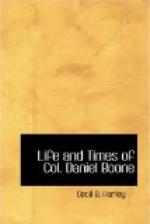At a general meeting of the settlers at Harrodstown, on the 6th of June, 1775, General George Rogers Clark, and Gabriel John Jones, were chosen to represent them in the Assembly of Virginia.
This, however, was not precisely the thing contemplated by Clark.[31] He wished that the people should appoint agents, with general powers to negotiate with the government of Virginia, and in the event that that commonwealth should refuse to recognize the colonists as within its jurisdiction and under its protection, he proposed to employ the lands of the country as a fund to obtain settlers and establish an independent State. The election had, however, gone too far to change its object when Clark arrived at Harrodstown, and the gentlemen elected, although aware that the choice could give them no seat in the legislature, proceeded to Williamsburg, at that time the seat of government. After suffering the most severe privations in their journey through the wilderness, the delegates found, on their arrival in Virginia, that the Legislature had adjourned, whereupon Jones directed his steps to the settlements on the Holston, and left Clark to attend to the Kentucky mission alone.
He immediately waited on Governor Henry, then lying sick at his residence in Hanover County, to whom he stated the objects of his journey. These meeting the approbation of the governor, he gave Clark a letter to the Executive Council of the State. “With this letter in his hand he appeared before the council, and after acquainting them fully with the condition and circumstances of the colony, he made application for five hundred-weight of gunpowder for the defense of the various stations. But with every disposition to assist and promote the growth of these remote and infant settlements, the council felt itself restrained by the uncertain and indefinite state of the relations existing between the colonists and the state of Virginia, from complying fully with his demand. The Kentuckians had not yet been recognized by the Legislature as citizens, and the proprietary claimants, Henderson & Co., were at this time exerting themselves to obtain from Virginia, a relinquishment of her jurisdiction over the new territory. The council, therefore, could only afford to lend the gunpowder to the colonists as friends, not give it to them as fellow-citizens."[32]




